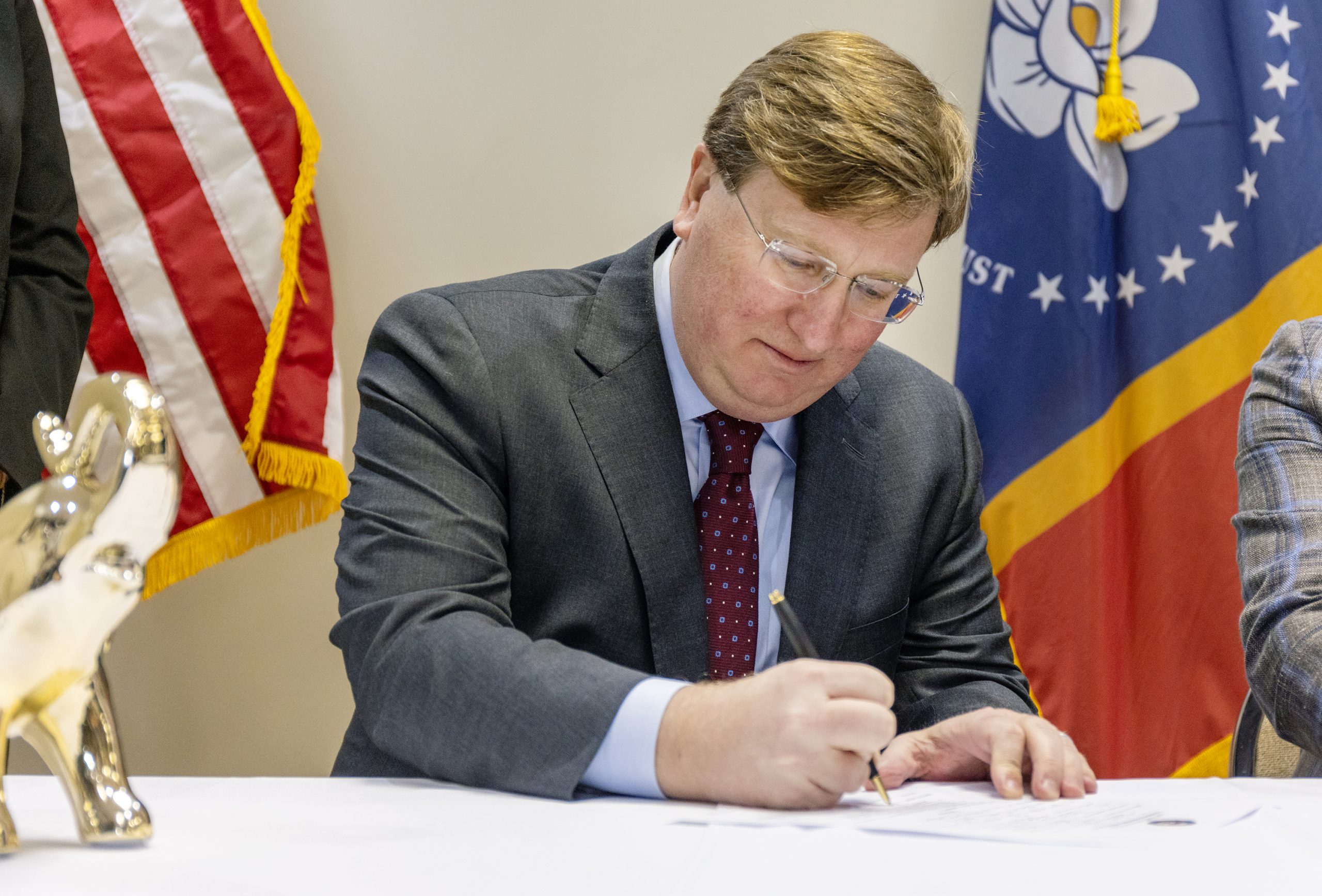Mississippi Today
Gov. Tate Reeves, with one tweet, digs up his controversial public education record

Gov. Tate Reeves, with one tweet, digs up his controversial public education record
Note: This editorial anchored Mississippi Today's weekly legislative newsletter.Subscribe to our free newsletterfor exclusive access to legislative analysis and up-to-date information about what's happening under the Capitol dome.
Senate Republican leaders shocked the state on Feb. 28 when they announced their intention to fully fund Mississippi's public school formula for just the third time since 2003.
Just a few minutes before the Senate was set to vote on the proposal on March 7, Gov. Tate Reeves took to Twitter with an eyebrow-raising warning to lawmakers.
“Be very cautious of a last minute change in funding formula that seems to have unanimous support amongst Democrats in Senate and liberal activist groups. Very very cautious,” Reeves tweeted, followed by his office sending his tweet to reporters as an official press statement. “Instead of funneling more money to the district offices — where our kids won't see it — why not another teacher pay raise? Put it in the classroom!”
A little more than an hour later, the supermajority in the Republican state Senate, apparently unfazed by their Republican leader's words, voted unanimously to do the exact opposite of what Reeves had warned. Every single Republican and Democrat in the Senate voted with virtually no debate to tweak the education funding formula and fully fund public schools.
The Senate plan, which would help local school districts cover basic costs such as supplies, building costs and, yes, teacher salaries, would require the state send an additional $181 million to the Mississippi Adequate Education Program per year. The proposal comes as Mississippi sits on a record revenue surplus of $3.9 billion, and more than $1 billion of that is recurring.
The politics of opposing full funding of public education during an election year are questionable at best. And even more problematic for Reeves is that his unprompted Twitter take dredged up his controversial record on one of the single biggest political issues of any campaign.
Reeves, at least on this issue, appears wildly out of step with Mississippi voters, including his Republican base. A new Siena College/Mississippi Today poll released today shows that a whopping 79% of Mississippians — including 73% of Republicans surveyed — believe lawmakers should fully fund public schools this session.
Democrat Brandon Presley, who is getting all sorts of statewide and national attention for his political upside against Reeves in the governor's race later this year, pounced immediately. As one longtime political operative put it in a text message later in the day: “I hear they're having a Field Day in Nettleton today,” referencing Presley's hometown.
“I commend both Republicans and Democrats in the state Senate for coming together across party lines unanimously to better fund our schools,” Presley tweeted shortly after the Senate vote. “As usual, Tate Reeves is now attacking this bipartisan effort and playing politics once again. Tate Reeves has shown over and over he cares more about HIS political career than OUR students. He won't lead. As governor, I will.”
Reeves' tweet leads astute political observers to recall Reeves' many black eyes from his action (or inaction) on public education related issues. If you're interested in taking a stroll down memory lane, here are just a few of those moments:
- In eight years as lieutenant governor, when he had deep influence over the state budget, Reeves raised teacher pay just two times — both during election years. And those pay raises were so marginal that education groups and teachers publicly panned them with descriptors like “a joke”; “insufficient”; “a slap in the face': “insulting”; and “another election-year-timed symbolic gesture.” His March 7 tweet suggested current lawmakers consider another teacher pay raise. Needless to say, that wasn't received too well.
- The governor highlighted in his March 7 tweet that the Senate full funding effort was “last minute.” But no one, seemingly, has forgotten about perhaps the most notorious “last minute” leader in modern political history regarding education-related moves. When Reeves was lieutenant governor, he famously sneaked $2 million for private school vouchers into an unrelated appropriations bill in the 2019 election year, drawing the broad ire of every single public education group.
- In 2017, Reeves and other legislative leaders tried and failed to rewrite the state's public education funding formula. A majority of Republican senators shot down Reeves' plan in broad daylight. Shortly after the Senate vote, Reeves went sour grapes and blamed reporters: “I know you're all smiling big today. You worked really hard to kill this, and you were very, very successful at doing so.” Reeves has rarely publicly discussed the failed rewrite effort since then, and he has neither tried nor proposed another rewrite effort.
- In Reeves' last five years as lieutenant governor, the Legislature underfunded Mississippi Adequate Education Program by $1.06 billion, according to data compiled by The Parents' Campaign. Since 2008 under the same measures, MAEP has gone underfunded by $3.35 billion, including a worst-ever stretch from 2012-2020 — the eight years Reeves served as leader of the Senate.
- From 2015-2019, his last four years as lieutenant governor, Mississippi's public education budgets were cut by $173.5 million ($102 million cut to Institutions of Higher Learning, $40 million cut to K-12 education, $32 million to community colleges).
- Several teacher loan forgiveness programs in 2016 received budget cuts so extreme from the Reeves-led Legislature that they had to stop forgiving loans for teachers. “It really got me thinking, ‘Well, my state's not really on my side here,'” a north Mississippi teacher said.
- And how soon we forget one of the biggest political blunders of modern politics. In 2019, late in his heated governor's race with Democratic Attorney General Jim Hood, Reeves released a TV ad touting his plan to raise public school teacher pay. There was just one problem: most of the ad was filmed inside a private school and featured several private school teachers. That private school, then a little-known entity, is now one of the most familiar schools in the state for all the wrong reasons. Reeves filmed the ad at New Summit School, owned by welfare and education fraudsters Nancy and Zach New, who were 2019 campaign donors of Reeves.
It remains unclear what Reeves thought he was doing March 7 with his social media warning to lawmakers and his effective trolling of the Senate's full funding proposal.
The Senate plan now moves to the House, where Republican leaders there have to decide whether to heed Reeves' warning. But legislative Democrats, like Presley, are already using the moment to apply pressure.
“This appropriation would be less than 5% of our nearly $4 billion surplus and he still doesn't want to spend it on Mississippi's public school students,” said Rep. Robert Johnson, the House Democratic leader. “If we're in the best financial shape in our state's history, as the governor so often likes to remind us, why should we have to choose? If he isn't interested in investing in public education now, will he ever be?”
Johnson continued: “If House Republicans and Tate Reeves think blocking $181 million from going into our public schools while they crow about a $4 billion surplus is a winning strategy going into an election year, then good luck to them.”
But before too long, we'll get some clarity on how Reeves' questionable take — effectively, “I know we have more money than we've ever had, but let's actually not send additional funding to our consistently struggling public schools during this major election year” — will affect his effort to win one more term in the Governor's Mansion.
This article first appeared on Mississippi Today and is republished here under a Creative Commons license.
Did you miss our previous article…
https://www.biloxinewsevents.com/?p=224378
Mississippi Today
On this day in 1937


May 1, 1937

Jackie Ormes became the first known Black cartoonist whose work was read coast to coast through the major black publication, the Pittsburgh Courier.
Her cartoon told the story of Torchy Brown, a Mississippi teenager who sang and danced her way from Mississippi to New York City, mirroring the Great Migration, when millions of African Americans trekked from the South to the North, Midwest and West.
In 1945, her cartoon, “Patty-Jo ‘n' Ginger,” started. The strip proved so popular that department stores sold Patty-Jo as a doll. Five years later, Torchy returned, this time as a confident and courageous woman who dared to tackle such issues as race, sex and the environment. Readers applauded this strong model of what young Black women could be.
In 2014, she was inducted into the Black Journalists Hall of Fame and was later featured by Google on its search page.
This article first appeared on Mississippi Today and is republished here under a Creative Commons license.
Did you miss our previous article…
https://www.biloxinewsevents.com/?p=354343
Mississippi Today
Work requirement will likely delay or invalidate Medicaid expansion in Mississippi
The final version of Medicaid expansion in the Legislature could leave tens of thousands of uninsured, working Mississippians waiting indefinitely for Medicaid coverage – unless the federal government makes an unprecedented move.
The compromise lawmakers reached minutes before a legislative deadline on Monday night makes expansion contingent on a work requirement. That means even if both chambers pass the bill, the estimated 200,000 Mississippians who would qualify for coverage would need to wait until the federal government, under either a Biden or Trump administration, approved the waiver necessary to implement a work requirement – which could take years, if ever.
Lawmakers in favor of the work requirement have not been open to allowing expansion to move forward while the work requirement is in flux. The House bill proposed expansion be implemented immediately but included a “trigger law” similar to North Carolina's. The “trigger law” mandated that if the federal government ever changed its policy on allowing states to implement a work requirement, Mississippi would move to implement one immediately.
Senator Brice Wiggins, R-Pascagoula, one of the Medicaid expansion conferees, posted on social media “if CMMS wants people covered then it will approve (the work requirement). Nothing prevents them from approving it other than POTUS/CMMS philosophy.”
But even in states where a work requirement was approved, litigation ensued, with the courts finding the approval of the work requirement unlawful for a number of reasons, according to a KFF report.
Senate Medicaid Chairman Kevin Blackwell, R-Southaven, did not respond to Mississippi Today by the time the story published.
Will a Biden – or Trump – administration approve the work requirement?
The Biden administration has never approved the waiver necessary for a work requirement and has rescinded ones previously granted under the Trump administration. Waivers granted under the Trump administration were not granted under the current circumstances as Mississippi.
Mississippi Today reached out to the Centers for Medicare and Medicaid Services for comment but did not hear back by the time of publication.
Joan Alker, Medicaid expert and executive director of Georgetown University's Center for Children and Families, explained that the Trump administration has never approved a work requirement up front for a traditional expansion plan like Mississippi's.
In states like Kentucky and Arkansas, Alker explained, the Trump administration approved work requirements as a means of limiting already-existing expansion plans. In Georgia, an outlier state that remains in litigation with the Biden administration for rescinding the state's work requirement waiver, the Trump administration approved a work requirement for a plan that isn't considered full “expansion” under the Affordable Care Act and doesn't draw down the increased federal match rate.
“If the Legislature passed a bill with both of those requirements being non-negotiable, (the work requirement and the enhanced match) they need to know that there is no precedent for that kind of approval from either a Biden or a Trump CMS,” she said.
What happens if a work requirement is approved?
In the best case scenario – that a work requirement is approved by some administration in the near future – its implementation could mean an increase in administrative costs and a decrease in eligible enrollees getting the coverage for which they qualify. Georgia's plan, for example, requires people document they're in school, working or participating in other activities. The requirement has cost taxpayers at least $26 million, and more than 90% of that has gone toward administrative and consulting costs, according to KFF Health News.
“Even if CMS does approve (it), actually implementing and administering work requirements is costly and complex,” explained Morgan Henderson, the principal data scientist on a study commissioned by the Center for Mississippi Health Policy and conducted by the Hilltop Institute at the University of Maryland, Baltimore County. “This would almost certainly significantly dampen enrollment relative to a scenario with no work requirements, and cost the state millions to implement.”
Many of the cases where work requirements were approved but then deemed unlawful were due to court rulings that found that the work requirement resulted in lower enrollment, counterproductive to the primary goal of Medicaid.
In addition to lowering enrollment, the work requirements have not led to increased employment, the primary goal of the work requirement, explained Alice Middleton, deputy director of the Hilltop Institute and a former deputy director of the Division of Eligibility and Enrollment at the Centers for Medicare and Medicaid Services.
“Recent guidance has been clear that work requirements would jeopardize health coverage and access without increasing employment,” Middleton said. “While a future Trump Administration may revisit these decisions and approve work requirements again, legal challenges are likely to follow …”
Senate leaders compromised with the House on a number of fine points regarding the work requirement: reducing the mandatory employment from 120 to 100 hours a month; reducing the number of employment verification renewals from four times to once a year; and removing the clause that would require the state to enter into litigation with the federal government, as Georgia did, if the federal government turns down the work requirement.
“It was encouraging to see both sides compromising, but, ultimately, the inclusion of work requirements presents multiple sets of challenges to successful expansion,” Henderson said.
This article first appeared on Mississippi Today and is republished here under a Creative Commons license.
Mississippi Today
Why many House Democrats say they’ll vote against a bill that is ‘Medicaid expansion in name only’
For a decade, House Democrats have been beating the drum — often when it seemed no one else was listening — to expand Medicaid to provide health care for working poor Mississippians.
It looks as though a large majority of those House Democrats as early as Wednesday will vote against and possibly kill a bill that purports to expand Medicaid.
They say the agreement reached late Monday between House and Senate Republicans may be called Medicaid expansion, but it is not written to actually go into effect or help the hundreds of thousands of Mississippians who need health care coverage.
“It is just like an eggshell with no egg in the middle,” said Rep. Timaka James-Jones, a Democratic from Belzoni in her first term. “It does not make sense.”
Republicans, who have have supermajorities in both the House and Senate and do not need a single Democratic vote to pass any bill, have for years relished their power over legislative Democrats. But when a three-fifths vote is needed and Republicans aren't in unanimous agreement like on this current bill, Democrats have real power to flex.
Earlier on Tuesday, after a closed-door luncheon meeting of House Democrats, Rep. Robert Johnson of Natchez, the minority leader, informed Speaker Jason White that 32 of the 41 House Democrats planned to vote no. That news sent shockwaves through the Capitol.
With several House Republicans also expected to vote no, that number of dissenting Democrats would likely prevent the legislation from getting the three-fifths majority needed to pass. And no votes by 32 Democrats would surely mean the proposal would fall short of the two-thirds majority that would be needed later to override an expected veto from Gov. Tate Reeves, who is opposed to accepting more than a $1 billion a year in federal funds to provide health care for an estimated 200,000 Mississippians.
At issue for the House Democrats is a work requirement that Senate Republicans insisted be placed in the bill and that House negotiators agreed to minutes before the Monday night deadline to reach an agreement between the two chambers.
Federal officials have made it clear in the past that they would not approve a work requirement as part of Medicaid expansion. But in the proposal that House and Senate leaders agreed to, Medicaid expansion would not go into effect until federal officials approve a work requirement.
Senate leaders have expressed optimism that the Biden administration would be so pleased with longtime Medicaid expansion holdout Mississippi making an effort that it would approve a work requirement, or that the conservative federal 5th Circuit Court would approve it if litigated.
“It is tough. For the 11 years I have served in the House, I have supported the state expanding Medicaid,” said Rep. John Faulkner, D-Holly Springs. “But the truth is this conference report really doesn't do anything to help poor people who need it.”
The comments made by Faulkner were echoed by multiple House Democrats at the luncheon meeting, according to numerous sources inside the meeting.
After that meeting, Democratic leader Johnson relayed those sentiments and the Democrats' plans to vote against the proposal to White.
So White called a Tuesday afternoon meeting with Johnson. After the Republican speaker and Democratic leader met behind closed doors, Johnson announced on the House floor that House Democrats would hold another caucus meeting. It did not last long.
After that meeting, several Democrats said their plans to vote against the bill had not changed, though some acknowledged privately that voting against the bill would be difficult. One member, when asked if the Democrats still planned to vote against the proposal in large numbers, replied, “It is fluid. I don't know. We will see.”
Many of the Democrats praised White, a first-term speaker, for finally tackling Medicaid expansion. And they praised the original House bill that that allowed Medicaid expansion to go into effect in Mississippi like it had in 40 other states even if a work requirement was struck down by federal officials. They also praised Republican Medicaid Chairwoman Missy McGee for her work to pass “a clean” Medicaid expansion bill.
READ MORE: House agrees to work requirement, Senate concedes covering more people in Medicaid expansion deal
But they expressed disappointment with the final agreement worked out between House and Senate leaders with the non-negotiable work requirement. They said they had informed House leaders all along that they would oppose a compromise that included a work requirement.
“We know all eyes are on us right now because the Republican supermajority couldn't reach an agreement among themselves,” said Rep. Daryl Porter, D-Summit. “Republican infighting on Medicaid expansion becoming our responsibility to referee feels unfair when they're the ones who couldn't get the support for their own bill. They're waiting to see if we'll bail them out.”
Several House Democrats said it would be difficult to go back home and explain to their constituents that they voted against Medicaid expansion.
But Rep. Rickey Thompson, D-Tupelo, said people should not view them as voting against Medicaid expansion simply because the bill would not expand Medicaid.
“It just puts something on paper, but it does not do anything,” said Thompson.
“It is not Medicaid expansion,” said Zakiya Summers, D-Jackson, who said she campaigned on Medicaid expansion when she first ran and was first elected in 2019. She spoke as a surrogate for Democratic gubernatorial candidate Brandon Presley last year in support of Medicaid expansion.
Rep. Bryant Clark, D-Pickens, said it would be more difficult to explain to constituents that they could not get health care through Medicaid even after the Legislature approved it than to vote against it and explain the reason for that vote.
Numerous members said Rep. Percy Watson, D-Hattiesburg, made the most salient point at the Democrats' first caucus meeting on Tuesday.
Watson, the longest serving member of the House, told the story of a vote in the 1982 session on a bill that would have allowed local school districts to enact kindergarten and require mandatory school attendance. Watson said he voted for the bill, but later was pleased that it died.
If that bill had passed, there would not have been the landmark special session later that year when statewide kindergarten was created and school attendance was mandated statewide.
“Sometimes it takes more than one session to pass something important,” Watson said.
Everyone at the Capitol is closely tracking what the House Democrats decide — including Senate Republicans, who are reportedly struggling to get a three-fifths vote of their own to pass the bill in that chamber.
After word spread Tuesday of the House Democrats' meeting and potential killing of the expansion bill, Senate Medicaid Chair Kevin Blackwell, R-Southaven, said he would not present the expansion proposal in his chamber until after the House acted.
The bill, which faces a Thursday evening deadline, could be sent back for additional negotiations where the work requirement could be removed. But the Senate has thus far not yielded on the work requirement — something that House Democrats, clearly, believe would result in the bill never going into effect.
READ MORE: Back-and-forth: House, Senate swap Medicaid expansion proposals, counter offers
This article first appeared on Mississippi Today and is republished here under a Creative Commons license.
-
Local News6 days ago
Sister of Mississippi man who died after police pulled him from car rejects lawsuit settlement
-
Mississippi Today6 days ago
At Lake High School in Scott County, the Un-Team will never be forgotten
-
Mississippi Today4 days ago
On this day in 1951
-
Mississippi News4 days ago
One injured in Mississippi officer-involved shooting after chase
-
SuperTalk FM2 days ago
Festival merger in Leland sets up one major event for Mississippi Delta
-
Mississippi News1 day ago
Two women accused of shoplifting across southeast captured in Mississippi
-
Mississippi News6 days ago
Ridgeland man sentenced for molesting girl
-
SuperTalk FM2 days ago
PERS bill set to phase in employer rate increase heads to governor’s desk






































